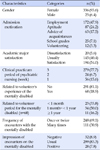Abstract
Purpose
The aim of this study was to explore factors associated with the social distance attitudes of nursing students towards adults with mental disorders. The relationship between social distance and attitudes toward adults with mental disorders was also examined.
Methods
A descriptive research was conducted to describe the characteristics of the population and the data were collected from September 22 to October 2, 2014. The sample included 359 participants. Social distance was measured by a modified version of the Social Distance Scale and CAMI was used to assess attitudes towards adults with mental disorders.
Results
Participants showed less authoritarian, more benevolence, less social restrictiveness in attitudes towards adults with mental disorders. The participants also showed a positive community mental health ideology. More importantly, the attitudes towards people with mental disorders was the strongest predictor (β=.67), explaining 35% of the social distance.
Conclusion
With a deeper understanding of social distance as related to attitudes towards people with mental disorders, it is possible to create targeted interventions with the overall goal of minimizing the social distance and authoritarianism and of facilitating benevolence among nursing students.
Figures and Tables
Table 2
Social Distance Difference according to the General Characteristics of the Participants (N=359)

References
1. Ministry of Health and Welfare. The epidemiological survey of mental disorders in Korea 2011. Ministry of health and welfare academic research report. Seoul: Seoul National University College of Medicine;2012.
2. Han KS, Park YH, Im HS, Ju GY, Bae MH, Kang HC. Hope, depression and suicidal ideation in chronic mental illness patients. J Korean Acad Psychiatr Ment Health Nurs. 2010; 19(2):205–211. DOI: 10.12934/jkpmhn.2010.19.2.205.

3. Ryu SA. Is it possible that people with mental disorders are reintegrated into our communities: the effect of social distance. Korean J Psychol Gen. 2010; 29(1):49–69.
4. Lee SY, Kim Y. Development plan of the national mental health policy. Ment Health Policy Forum. 2008; 2:3–36. Available from:http://www.dbpia.co.kr/Article/NODE01921850.
5. Corrigan PW, Slopen N, Gracia G, Phelan S, Keogh CB, Keck L. Some recovery processes in mutual-help groups for persons with mental illness; II: qualitative analysis of participant interviews. Community Ment Health J. 2005; 41(6):721–735. DOI: 10.1007/s10597-005-6429-0.

6. Choi WK, Park HJ. A study of social distance for persons with disabilities. J Disabil Welf. 2009; 10:69–105.
7. Jung JS, Park ME. A study on college students' social distance toward people with the mental illness. J Rehabil Res. 2013; 17(2):253–277.
8. Kim HS, Kim SH. Misunderstanding and prejudice in mental health area. Bull Yong-in Psychiatr Inst. 1995; 2(2):183–199.
9. Wallach HS. Changes in attitudes towards mental illness following exposure. Community Ment Health J. 2004; 40(3):235–248. DOI: 10.1023/B:COMH.0000026997.92083.4d.

10. Choi SS, Youn SJ, Park MJ, Choi YJ. A study on the factors affecting the perceived stigma of the mentally disabled. J Rehabil Res. 2008; 12(3):91–115.
11. Kim MG. Effects of vocational roles on the perceived prejudice of people with psychiatric disabilities. Korean J Soc Welf Stud. 2009; 40(3):299–326. DOI: 10.16999/kasws.2009.40.3.299.

12. Seo MK, Kim CN. A comparison of public's stigma against the mental patients and mental patients' perceived stigma. J Korean Neuropsychiatr Assoc. 2005; 44(3):371–375.
13. Chung YH, Choe JS, Kim EH, Kim JS, Choi HK. A study on the stigma held by nursing college students against mental illness and mentally ill patients. Korean J Soc Issues. 2008; 16(2):195–210.
14. Kim HS, Eom MR. Original Articles: nursing students' attitude toward the mental illness and ego state. J Korean Acad Psychiatr Ment Health Nurs. 2005; 14(3):276–284.
15. Kim MO. A study of social distance on people with disability and self concepts of social work students. Ment Health Soc Work. 2003; 15:138–167.
16. Laumann EO. Subjective social distance and urban occupational stratification. AJS. 1965; 71(1):26–36. DOI: 10.1086/223990.

17. Youn IS, Park SY. A Study of factors influencing on children's social distance towards children from multicultural families. AJMAHS. 2016; 6(3):191–202. DOI: 10.14257/ajmahs.2016.03.05.

18. Westie FR. Negro-white status differentials and social distance. Am Sociol Rev. 1952; 17(5):550–558. DOI: 10.2307/2088221.

19. Taylor SM, Dear MJ. Scaling community attitudes toward the mentally ill. Schizophr Bull. 1981; 7(2):225–240. DOI: 10.1093/schbul/7.2.225.

20. Lee JH, Lee CS, Hwang TY, Han GS, Lee YM. Community attitudes toward the mental-ill in Suseo-Ilwon community. Bull Yong-in Psychiatr Inst. 1996; 3(2):188–202.
21. Kang HY, Han SY. A study on social distance of nursing students toward minority groups in a metropolitan city. J Korean Public Health Nurs. 2013; 27(1):166–178. DOI: 10.5932/jkphn.2013.27.1.166.

22. Kim HR, Moon GH, Park JH, Song YJ, Yoon HM, Lee SY, et al. A comparative study of the nursing students and of the nonnursing students of their mental illness knowledge and in their attitudes toward the mental illness. J Ewha Nurs Sci. 2014; (48):63–79.
23. Moon S, Lee JS, Park SK, Lee SY, Kim Y, Kim YI, et al. Factors affecting social distance toward mental illness: a nationwide telephone survey in Korea. J Prev Med Public Health. 2008; 41(6):419–426. DOI: 10.3961/jpmph.2008.41.6.419.

24. Sim SY. An attitude of mental health social worker for mental patients [master's thesis]. [Daegu]: Kyungpook National University;2013. 73.
25. Park MH, Kwon HK. Social distance towards people with the intellectual disability amongst Korean university students. J Life-span Stud. 2013; 3(2):51–71.
26. Jeon HH. A comparative study of the knowledge and attitudes about mental illness of the hospital staff and the public [master's thesis]. [Seoul]: Konkuk University;2012. 73.
27. Seo MK, Kim CN, Lee MK. Effect of biogenetic causal explanation and familiarity with mental illness on social distance toward persons with mental disorders. Korean J Health Psychol. 2010; 15(1):123–141. DOI: 10.17315/kjhp.2010.15.1.008.

28. Kim SH. Nursing students recognition of rightin mentally ill persons and attitudes toward mental illness [master's thesis]. [Naju]: Dongsin University;2012. 65.
29. Kang MO. The effects of facilitative communication skill training using role play on prejudice and intention of interaction with the mentally-disabled among nursing students. Korean J Psychodrama. 2009; 12(2):23–39. DOI: 10.17962/kjp.2013.16.2.009.





 PDF
PDF ePub
ePub Citation
Citation Print
Print






 XML Download
XML Download